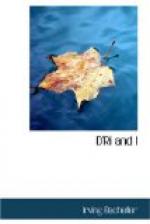Only one Britisher was brought down by our bullets, and he had been the mark of D’ri: with him a rifle was never a plaything. Five others lay writhing in the grass, bereft of horse, deserted by their comrades. The smudges were ready, and the nets. D’ri and I put on the latter and ran out, placing a smudge row on every side of the Hermitage. The winged fighters were quickly driven away. Of the helpless enemy one had staggered off in the brush; the others lay groaning, their faces lumpy and one-sided. A big sergeant had a nose of the look and diameter of a goose-egg; one carried a cheek as large and protuberant as the jowl of a porker’s head; and one had ears that stuck out like a puffed bladder. They were helpless. We disarmed them and brought them in, doing all we could for their comfort with blue clay and bruised plantain. It was hard on them, I have often thought, but it saved an ugly fight among ladies, and, no doubt, many lives. I know, if they had taken us, D’ri and I would never have got back.
I have saved myself many a time by strategy, but chose the sword always if there were an even chance. And, God knows, if one had ever a look at our bare bodies, he would see no sign of shirking on either D’ri or me.
X
The shooting and shouting and the tramp of horse and man had roused everybody in the big house. Even the general came down to know what was the matter. The young ladies came, pale and frightened, but in faultless attire. I put an armed guard by the prisoners at the door, under command of D’ri. Then I had them bare the feet of the four Britishers, knowing they could not run bootless in the brush. We organized a convoy,—the general and I,—and prepared to start for the garrison. We kept the smudges going, for now and then we could hear the small thunder of hornet-wings above us. There is a mighty menace in it, I can tell you, if they are angry.
“Jerushy Jane Pepper!” said D’ri, as he sat, rifle on his knee, looking at his prisoners. “Never thought nobody c’u’d luk s’ joemightyful cur’us. Does mek a man humly t’ hev any trouble with them air willy-come-bobs.” He meant wasps.
I had had no opportunity for more than a word with the young ladies. I hoped it might come when I went in for a hasty breakfast with the baroness, the count, the general, and Mr. Parish. As we were eating, Louison came in hurriedly. She showed some agitation.
“What is the trouble, my dear?” said the baroness, in French.
“Eh bien, only this,” said she: “I have dropped my ring in the brook. It is my emerald. I cannot reach it.”
“Too bad! She has dropped her ring in the brook,” said the baroness, in English, turning to me.
“If she will have the kindness to take me there,” I said to the hostess, rising as I spoke, “I shall try to get it for her.”
“M’sieur le Capitaine, you are very obliging,” said she. Then, turning to Louison, she added in French: “Go with him. He will recover it for you.”




